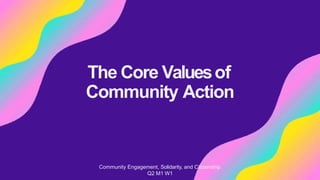
cescq2module1week1-230220003035-8e42d0e3 (1).pptx
- 1. The Core Valuesof Community Action Community Engagement, Solidarity, and Citizenship Q2 M1 W1
- 2. Objectives Students Should BeAble T o: Community, Engagement, Solidarity, And CitizenshipQ2 M1 W1 IdentifyTheCoreV aluesOf CommunityAction UnderstandTheCore Valuesof Community Action AnalyzeTheCoreValues of Community Action ExplainTheCore Valuesof Community Action
- 3. Core Values Community, Engagement, Solidarity, And CitizenshipQ2 M1 W1 Arethefundamentalbeliefsof aperson or organization.Theseguiding principles dictatebehaviorandcanhelppeople understandthedifferencebetweenright and wrong.
- 4. The value of the person isof infinite value. 1. Being physical (madeof matter),hemustmaintainhealthand harmonywith nature. 2. Being spiritual (capableof higherconcernsandof rising abovethematerial),hemustcultivate aglobalspirituality whichessentiallyconnectshimwithGodandthewhole Earthcommunity . 3. Being intellectual (giftedwithmind,thefacultyof knowing),hemustconstantlysearchfor thetruth.He seeks knowledgethatwouldtransformsocietyandtheworld.At thesametimehemaintainsatolerantandopen dispositionof the mind. Community Engagement Solidarity and citizenship Q2 M1 W1
- 5. 4. Being moral (endowedwiththefacultyof freelychoosing andloving) hemustgo outtoothersandinfacttoall humanityin love. 5. Being social (livinginacommunity),hemusthelpbuild peace andjusticeinoursociety ,throughthepursuitof family solidarityaswellasthecommongood andwell-beingof the largersociety .Hemustalsocultivaterespectfor humanrights andactivate non-violence. 6. Being economic (bound toconcernsof productionand consumption),hemusthelpachievethegoalof amore humanandsustainabledevelopmentfor the community .
- 6. 7. Being political (relatingtotheconductof politicalaffairs withinthenationandtheworld),hemustcultivatehissense of nationalismandglobalism.Fortheformer,loveof countryandnationalunityareforemostconcernswhilefor thelatterglobalsolidarityandpeacearethefundamental goals.
- 7. The Core Valuesof CommunityAction Community, Engagement, Solidarity, And CitizenshipQ2 M1 W1 Human Rights Social Justice Empowerment and Advocacy Participator y Development GenderEquality
- 8. 1. Human Rights Community, Engagement, Solidarity, And CitizenshipQ2 M1 W1 Arerightsinherentinallhuman beingswhatevertheirnationality , placeof residence,sex,nationalor ethnicorigin,color,religion, language,or anyotherstatusis. Weare all equallyentitledtoourhuman rights without discrimination.
- 9. Characteristics Community, Engagement, Solidarity, And CitizenshipQ2 M1 W1 Universal and Inalienable Interdependent and Indivisible Equal and Non-discriminatory Entail both rights and obligations
- 10. The Universal DeclarationS o L f IDE 7 ty, Engagement, Solidarity,And Human Rights (UDHR), adopted by the UN General Assembly in 1948, was the first legal document to set out the fundamental human rights to be universally protected. The UDHR, which turned 70 in 2018, continues to be the foundation of all international human rights law. Communi CoCmimtizuennitsyhEipngagementSolidarity and Citizenship Q2 M1 W1
- 11. The Basic Human Rights 1Right to life Community, Engagement, Solidarity, And Citizenship 3Right to Property 1. “Universal Declaration of Human Rights” 2.Article 17: Everyone hasa Human Right to own a property. 3.Article 12: Everyone has Human Life to Privacy and Family life 2Right to Liberty 1. Freedom of Speech 2. RightAgainst Unreasonable Searches and Seizure 3. Right to Information 4. Right to Bail 5. Right to form Union 6. Religious Freedom 7. Right to political beliefs and aspirations 1. Right to live 2. Right to safe environment 3. No torture, Force and Violence 4. Free accessto court 5. Right to due process of law
- 12. CLASSIFICATION OF HUMAN TIGHTS
- 15. 2. Social Justice Community, Engagement, Solidarity, And Citizenship Is a societal value which guides human interaction and, in particular, the fair distribution of society’s benefits, advantages, and assets. Social justice is being equal under the law and all aspects of society
- 16. Justice is the concept of fairness. Social justice is fairness as it manifests in society. That includes fairness in healthcare, employment, housing, and more. In a socially- just society, human rights are respected and discrimination is not allowed to flourish.
- 17. 3. Empowerment and Advocacy Community, Engagement, Solidarity, And Citizenship • Authority or power given to someone to do something. • The giving or delegation of power or authority; authorization; the giving of an ability; enablement or permission.” Empowerment is based on the belief that employees have the ability – and want to take on more responsibility.May 1, 2019
- 18. Four Elements of Empowerment 1. Access to Information 2.Accountability information is power, It is impossible for the poor to participate and take effective action if there is lack of pertinent, appropriate, and easy- reading information. The more informed the people are the more active they can be in taking the opportunity to participate and get access to service, exercise their rights, negotiate effectively and hold the state accountable. this term refers to the ability to call public officials and other service providers to make them accountable for their policies, actions and use of funds. The WB identified three types of accountability mechanisms; Political, administrative, and public. Political accountability refers to making political parties and representatives accountable through elections. Administrative accountability of government is achieved through internal accountability mechanisms within and among agencies. Public or social accountability holds government agencies accountable to citizens.
- 19. 3. Local Organization Capacity 4. Inclusion and Participation This element refers to the ability of people to work together, organize themselves and mobilize resources to solve problems of common interest. Organized communities are more likely to have their voices heard and their demands met than the communities that are not organized or with small organizations. Local community organizations capacity building is key to their effectiveness. as explained by the WB, inclusion focuses on the question about who are included. On the other hand, participation tackles the question how are they included and what role do they play? However, in the attempt to withstand “inclusion and informed participation,” it necessitates altering the rules in order to provide a space for people to deliberate on issues and “participate directly or indirectly in local and national settings, budget formation and
- 20. 4. Participatory Development Community, Engagement, Solidarity, And Citizenship • Highlight the involvement of the voiceless, those who are marginalized in the development process. • It gives recognition and importance to the poor and disadvantaged people, as well as a chance for them to be heard and get involved in discussion of social issues that affect the community.
- 21. 5. Gender Equality Community, Engagement, Solidarity, And Citizenship • Seeks the equal treatment of men and women • Equal opportunities in life • Elimination of discrimination based on gender, equal pay for equal work.